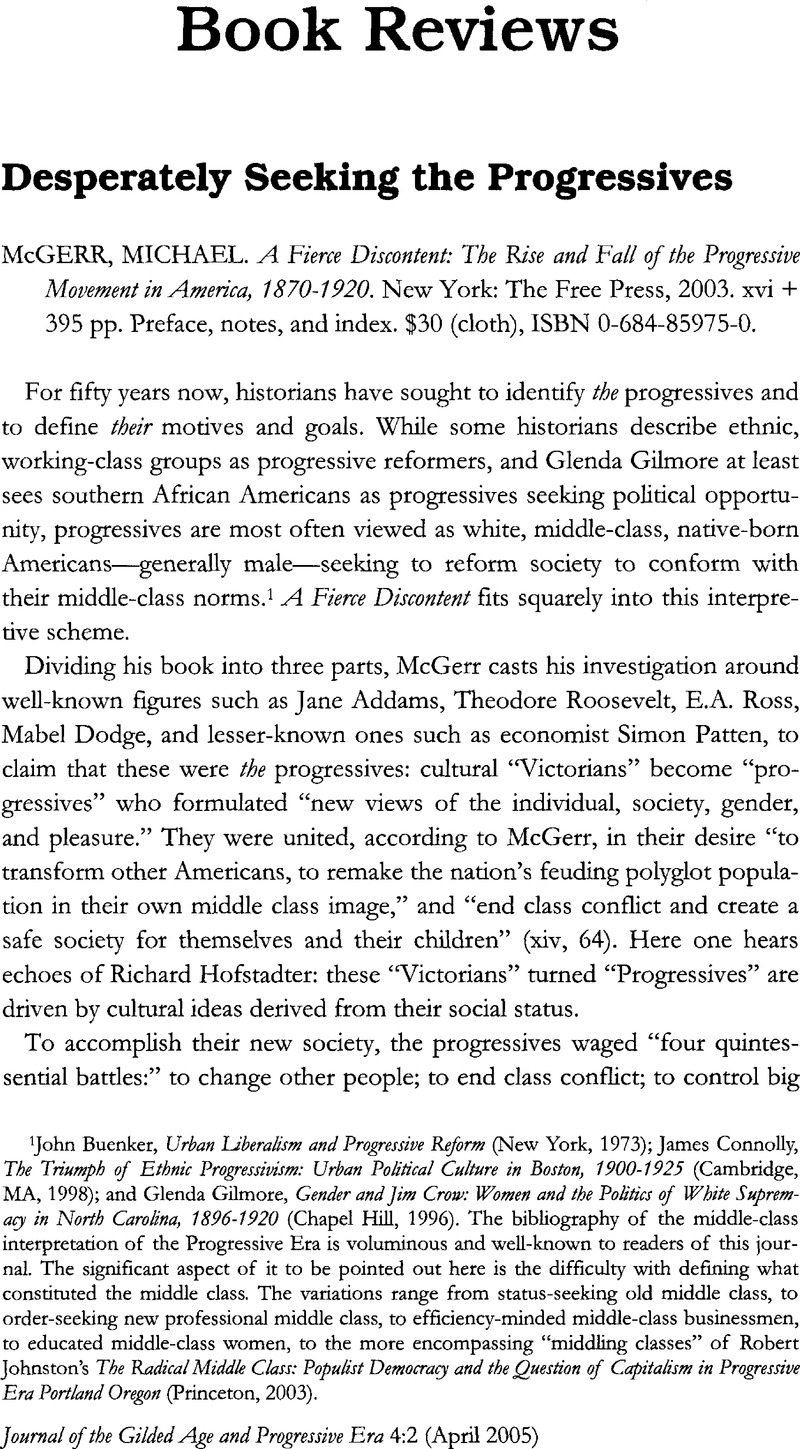No CrossRef data available.
Article contents
Desperately Seeking the Progressives - Michael McGerr. A Fierce Discontent: The Rise and Fall of the Progressive Movement in America, 1870-1920. New York: The Free Press, 2003. xvi + 395 pp. Preface, notes, and index. $30 (cloth), ISBN 0-684-85975-0.
Published online by Cambridge University Press: 08 November 2010
Abstract

- Type
- Book Reviews
- Information
- Copyright
- Copyright © Society for Historians of the Gilded Age and Progressive Era 2005
References
1 Buenker, John, Urban Uberalism and Progressive Reform (New York, 1973)Google Scholar ; Connolly, James, The Triumph of Ethnic Progressivism: Urban Political Culture in Boston, 1900-1925 (Cambridge, MA, 1998)Google Scholar ; and Gilmore, Glenda, Gender and Jim Crow: Women and the Politics of White Supremacy in North Carolina, 1896-1920 (Chapel Hill, 1996).Google Scholar The bibliography of the middle-class interpretation of the Progressive Era is voluminous and well-known to readers of this journal. The significant aspect of it to be pointed out here is the difficulty with defining what constituted the middle class. The variations range from status-seeking old middle class, to order-seeking new professional middle class, to efficiency-minded middle-class businessmen, t o educated middle-class women, to the more encompassing “middling classes” of Robert Johnston's The Radical Middle Class: Populist Democracy and the Question of Capitalism in Progressive Era Portland Oregon (Princeton, 2003)Google Scholar.
2 Kloppenberg, James, Uncertain Victory: Social Democracy and Progressivism in European American Thought, 1870-1920 (New York, 1986).Google Scholar
3 For examples, see Flanagan, Maureen A., Seeing with Their Hearts: Chicago Women and the sion of the Good City, 1871-1933 (Princeton, 2002)Google Scholar ; Graham, Sara Hunter, Woman Suffrage and the New Democracy (New Haven, 1996)Google Scholar ; Muncy, Robyn, Creating a Female Dominion in American Reform, 1890-1935 (New York, 1991)Google Scholar ; Spain, Daphne, How Women Saved the City (Minneapolis, 2001)Google Scholar.
4 See Perry, Elisabeth Israels, “Men Are from the Gilded Age, Women Are from the Progressive Era,” Journal of the Gilded Age and Progressive Era 1 (January 2002): 25–48CrossRefGoogle Scholar for a critique of the failure of many historians to consider women and power as a fundamental part of the Progressive Era.
5 See her essay, “Industrial Amelioration,” in Democracy and Social Ethics, ed., Seigfried, Charlene Haddock, (Urbana, 2002): esp. 63-65 and 74Google Scholar.
6 See the discussion in, Johnston, Robert D., “Re-Democratizing the Progressive Era: The Politics of Progressive Era Political Historiography,” Journal of the Gilded Age and Progressive Era 1 (January 2002): 68–92CrossRefGoogle Scholar.




